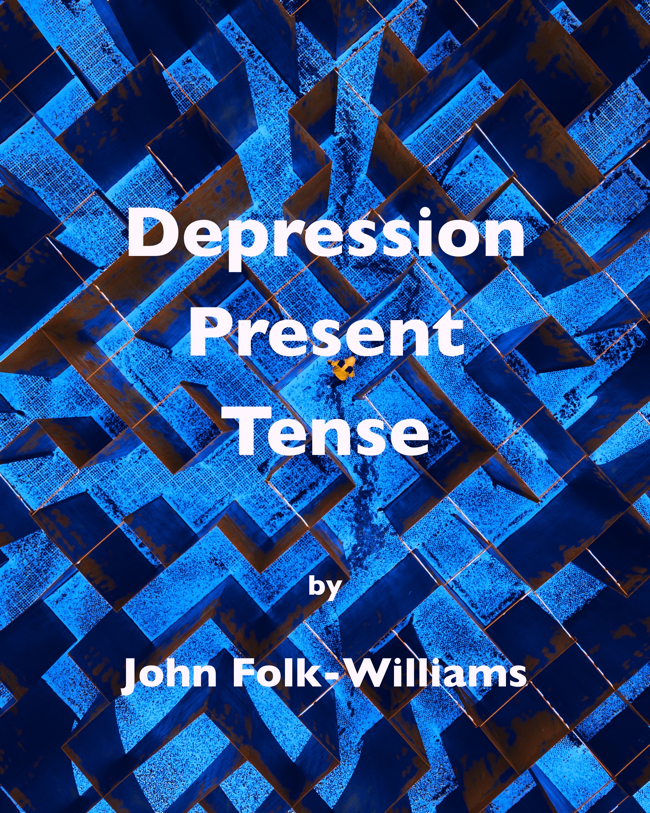
My latest ebook, Depression Present Tense, is now available at Amazon and the other major online retailers. Like Surviving Depression Together and A Mind for Life, it draws together a number of posts from Storied Mind and weaves them into a book to capture the immediate feelings, sights, sounds, terrors and joys of living with depression and struggling to heal despite its pervasive presence. Depression Present Tense opens with childhood memories about the origins of family trauma and early signs of isolation and loss of self-esteem. It goes on to detail the long struggle to have a working life despite the frequent attacks of depression, anxiety and panic. Then come the day-to-day confrontations with a damaged self and the endless efforts to heal as a good life gradually re-emerges.
My story is one of moments of crisis and insight, the jagged edges of experience never quite fitting together in a smooth story arc. I’ve tried to help you experience the fears and uncertainties, the glimmers of hope and love, the hard work of facing the worst the illness has to offer. This was the most difficult of the three ebooks to complete because it deals with so many traumatic events but also so many breakthrough moments of healing that it was hard to relive them to get them clear on the page. I’ve also included essays about writing to heal and how central and hard that has been to my recovery.
Depression Present Tense is available for pre-order before July 31, when it will be downloadable from Amazon. The ebook is now available for download in other formats at Apple iBooks, Barnes & Noble Nook, Kobo and other online retailers through this universal link. The price everywhere is US$2.99.
I hope you’ll read this last of the three Storied Mind ebooks, and catch up on the others if you haven’t read them before. If you find any of them helpful, please leave a rating or review. Those are really important to get the book noticed and read more widely. Thanks for your help and support!

Hi John,
I hope you’re well. My boyfriend has depression and has suffered with it since he was a teenager from being bullied in high school and well into his mid 40’s. He is 44 now and has stopped drinking and is seeing a psychologist which has become more frequent in the last 2 months as he has anxiety and depression from being in a relationship. We have been dating for almost 12 months in December this year and has become so unsure, questioning whether we are compatible for one another and given that it’s my first time dating someone with depression it is all new for me and dealing with things through instinct- listening, being supportive, understanding and just being there giving me insight on what depression is really like. What went from amazing and caring moved into being distant, making me feel abandoned and seeing when he will get back to his normal happy self which he was in the last 9-10 months of the relationship. Any support for women dealing with a bf that has depression would be amazing. He is getting better though but I’m emotionally drained out at times. Thanks, Eunice (Sydney, Australia)
Remember, you are responsible for taking care of yourself. Other adults are responsible for taking care of themselves. It is never wrong to want to be there for others. But when your own health and happiness are at stake, please be willing to take a step back and assess your situation. While you wait for him to recover, you are putting your own life on hold.
I bought your ebook Depression Present Tense this morning and have read 50% of it today. So much of it — especially about resistance and fear is exactly what I have been trying to put words to in my own writing. My sense of direction while driving is so awful, it’s a family joke. I unfailingly get so lost I miss appointments, I become confused about which side of town I live on (after living here all my life), and I turn toward the setting sun positive I am headed east. While reading your book, I realized this resistance you talk about is just like my sense of direction. It sends me away from my intended destination over and over till I feel hopelessly lost, find a place to turn around, and hope I can get back to a place that feels safe. Then I crawl under the covers or into a dark closet and vow to never come out. More often than not it looks like a giant STOP sign before I ever get out the door. It goes by other names like “fear of failure” or “humiliation” or “frustration” or plain old lack of motivation. The surge of energy that puts me on the road to something I really want, like recovery from depression, becomes more like the weak pulse of a dying animal the minute I put feet to the floor and start walking that direction. It has become so much worse the last 3 yrs. But I find hope in your book, because I think that, like you, putting the problem into words clarifies it for me. The right metaphor brings it to life and helps cement it in my conscious mind. I want more than anything to move because the place I live is destroying me like you said some jobs destroy you. Now I think I can start drawing the map. Thanks, John. You always inspire me.
Great to hear from you, Donna – Thanks for buying the book, I’m so glad you found something familiar in it – not that I would wish depression on anyone! All my best to you! John